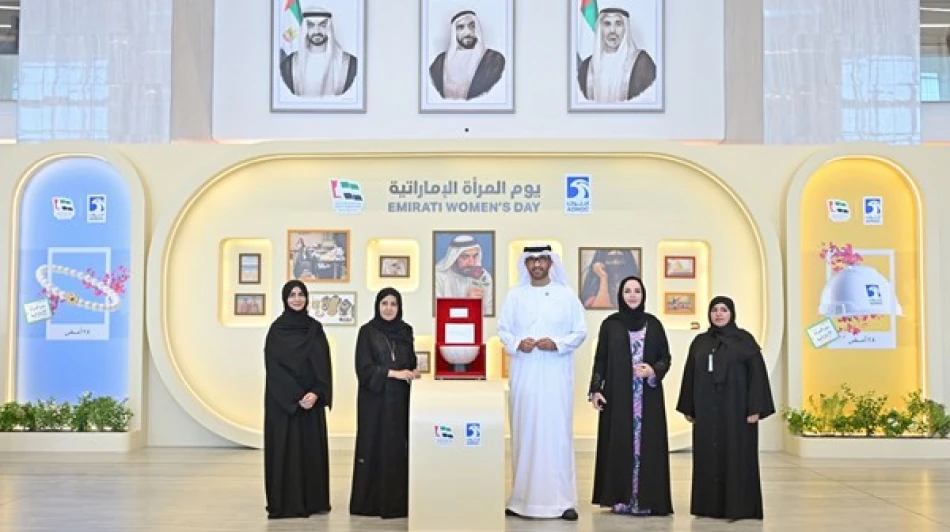
Emirati Women's Day Reflects UAE's Proud Achievements and Empowerment Journey
UAE's Energy Giant ADNOC Leads Corporate Gender Equality Push as Nation Celebrates Women's Achievements
The UAE's state oil company ADNOC has emerged as a flagship example of corporate gender equality in the Middle East, with women now occupying 26% of executive positions and representing over 40% of graduates from the company's artificial intelligence accelerator program. The milestone comes as the nation celebrates Emirati Women's Day under the theme "Hand in Hand... Celebrating the Golden Jubilee," highlighting how the oil-rich nation is leveraging female talent to drive its economic diversification beyond hydrocarbons.
Royal Leadership Sets National Tone on Gender Equality
Her Highness Sheikha Fatima bint Mubarak, known as the "Mother of the Emirates," emphasized during ADNOC's commemoration that Emirati women have become fundamental pillars in building society alongside men. Speaking through Minister of State Dr. Maitha bint Salem Al Shamsi, she highlighted how this year's celebration aligns with the UAE's "Year of Society" initiative, reflecting the leadership's strategic vision to enhance women's capabilities across social, economic, and technological sectors.
The royal endorsement carries significant weight in a region where top-down leadership often drives social change. Unlike gradual grassroots movements seen in Western countries, the UAE's approach demonstrates how monarchical systems can accelerate gender equality when leadership commits to progressive policies.
ADNOC's Transformation: From Oil Fields to AI Leadership
Dramatic Workforce Changes Since 2016
ADNOC's gender statistics reveal a remarkable transformation in the traditionally male-dominated energy sector. Since 2016, female representation has doubled across the company and its subsidiaries, with women now contributing to the boards of 20 ADNOC subsidiary companies. Technical field positions held by women have increased by 20%, signaling a shift away from the stereotype of oil and gas as exclusively masculine industries.
Dr. Sultan Ahmed Al Jaber, UAE's Minister of Industry and Advanced Technology and ADNOC's CEO, credited the late Sheikh Zayed bin Sultan Al Nahyan, the UAE's founding father, with establishing the foundations for women's empowerment. This historical context matters: the UAE's gender equality push isn't a recent trend but builds on decades of policy groundwork.
AI Strategy Powered by Female Talent
Perhaps most striking is ADNOC's artificial intelligence initiative, where Emirati women comprised over 40% of the 148 engineers who recently graduated from the "ADNOC AI Accelerator Program." This statistic positions the UAE ahead of many Western nations in STEM gender representation and signals the country's serious intent to become a global AI hub.
The company's ambition to become "the world's most AI-enabled energy company" relies heavily on this female talent pipeline, suggesting that gender equality isn't just a social goal but an economic necessity for the UAE's technological transformation.
Regional and Global Context: Leading by Example
ADNOC's approach contrasts sharply with energy companies in neighboring Saudi Arabia, where women only recently gained the right to drive and work alongside men. While Saudi Arabia's Vision 2030 includes similar gender equality goals, the UAE appears several years ahead in implementation, particularly in technical fields.
Compared to international oil majors like ExxonMobil or Shell, ADNOC's 26% female executive representation is competitive, though still trailing companies like Norway's Equinor, where Nordic gender equality traditions run deeper. However, ADNOC's rapid progress suggests it could surpass many Western counterparts within the next decade.
Economic Implications: Beyond Social Progress
The UAE's investment in female talent reflects broader economic realities. As oil revenues face long-term uncertainty due to global energy transition, the Emirates needs maximum human capital utilization to diversify its economy. Women represent an underutilized resource that, when properly integrated, can significantly boost productivity and innovation.
ADNOC's family-friendly policies, including flexible work arrangements and parental support, earned recognition from the Abu Dhabi Early Childhood Authority. These initiatives address a critical challenge: how to maintain traditional family structures while maximizing women's economic participation.
Future Trajectory: Sustainable Progress or Peak Achievement?
The key question is whether ADNOC's progress represents sustainable change or a high-water mark. The company's systematic approach—linking gender equality to AI strategy, board representation, and family support—suggests institutional commitment beyond mere public relations.
However, the broader test will come as other UAE companies and government entities adopt similar practices. ADNOC benefits from state backing and enormous resources; smaller private companies may struggle to replicate these policies without regulatory requirements or financial incentives.
For international investors and energy partners, ADNOC's gender equality progress signals operational sophistication and long-term strategic thinking. Companies that can successfully integrate diverse talent pools typically demonstrate better governance and adaptability—crucial factors as the global energy sector navigates unprecedented technological and environmental challenges.
Most Viewed News

 Layla Al Mansoori
Layla Al Mansoori






